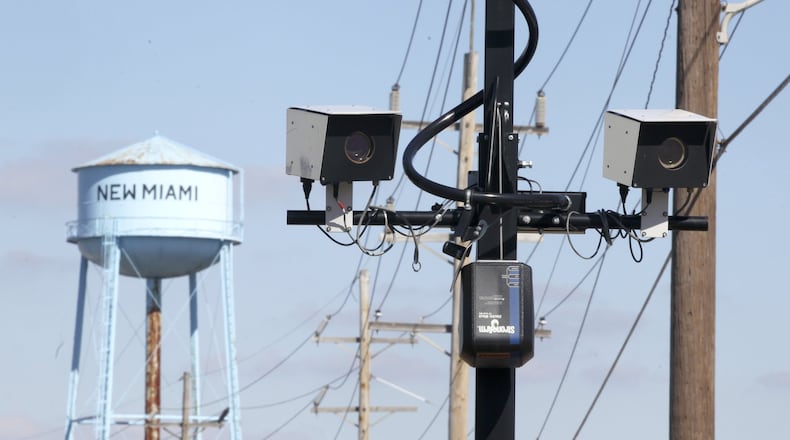NEW MIAMI SAFETY STUDY
Complying with a new state law, the village of New Miami commissioned a safety survey along U.S. 127 where the now-dormant speed cameras are located. The study looked at accidents from 2009-13 and speeds were measured in March.
26: Number of accidents
30.7 percent of the accidents resulted in physical injury
30.8 percent of the crashes were into fixed objects
26.9 percent of the crashes were fender benders
There were 433 drivers who sped past the cameras going 10 or more miles over the 35 mph speed limit
The majority of the drivers, 8,035, who drove the road in March were going 36 mph to 40 mph
Speed cameras could soon be rolling again in New Miami if a judge rules the village’s updated ordinance agrees with new state law.
The village of about 2,000 residents was ordered to shut down its speed cameras over a year ago. Retired Common Pleas Judge Michael Sage at the time declared the devices unconstitutional and banned their use in New Miami.
Later, the village crafted a new law that reflected changes the state legislature made to speed camera regulations.
Wilson Weisenfelder, the village attorney, asked for Judge Michael Oster to decide if the village can resume use of the speed cameras under the new ordinance, which they feel is in accordance with the new state law.
The village’s new ordinance states a police officer will be stationed at the cameras and that traffic citations will not be issued for driving less than 10 miles over the speed limit of 35 mph or six miles over the speed limit in school and park zones.
“What was argued was that the injunction that is in place should not apply to the village’s amended ordinance,” Weisenfelder said.
Acting Mayor Bob Henley said if Judge Oster rules in their favor, the village can have the cameras back up and running within about two months.
The cameras are being stored in Georgia with their owner Optotraffic, he said. The speed cameras were installed in 2012 and after 15 months in operation, the village collected about $1.8 million on 44,993 citations.
Oster held a hearing on the speed camera case last week, and Weisenfelder said a ruling is expected this week.
“He will render a decision in one form or another,” he said.
“We made it clear to the judge we’re not asking you to rule one way or the other whether the new ordinance is constitutional or not, that would be an advisory opinion,” he said.
Courts are not permitted to make rulings on lawsuits that haven’t happened yet, and the plaintiffs in this case say that is exactly what the village is asking Oster to do.
One of the plaintiff’s attorneys, Charlie H. Rittgers, said not only is asking for an advisory opinion wrong, but the new ordinance still has due process issues so it shouldn’t be enforced.
“There is no claim or evidence yet before the court that any plaintiff or class member currently before the court had been so affected or threatened by the revised ordinance to bestow standing to challenge its constitutionality on such a person at this moment,” Rittgers wrote, objecting to the village’s request.
Another plaintiff’s attorney, Josh Engel, said he doubts the judge is going to allow the cameras to roll again.
“They’ve asked him to say ‘hey their new ordinance is okay’,” Engel said. “He doesn’t seem inclined to give them any opinion about that whatsoever.”
Meanwhile, Weisenfelder said all eyes in the speed camera world are on Columbus, where the city of Dayton has filed a memorandum in favor of jurisdiction with the Ohio Supreme Court.
Dayton and several other jurisdictions have challenged — and won at the trial court level — the constitutionality of the new law, that requires a full-time — no part-timers allowed — police officer camp out with the cameras, that speed studies be ordered and no tickets can be issued to speeders who go under six miles over the speed limit in school and park zones and 10 miles elsewhere. Dayton and others have argued the law tramples their home rule authority.
Weisenfelder said the new law is a bit vague.
“An officer doesn’t have to be doing anything, he just has to be present,” Weisenfelder said. “He just has to be there, the way the statute’s written he could probably be asleep in the car.”
Henley said he couldn’t get into specifics, but when the time comes they will be able to staff the cameras.
“We will have when the time comes, we’ve got things in motion,” he said. “If they were set up right now, no we couldn’t do it. But we’ve got plans, as long as they don’t fall through we’ll be alright.”
About the Author
